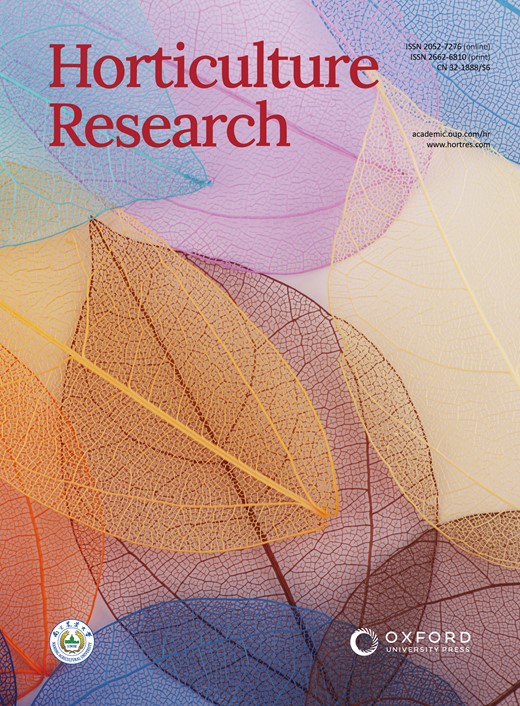基因型相关核心菌增强宿主对猕猴桃细菌性腐烂病的抵抗力
IF 8.7
1区 农林科学
Q1 Agricultural and Biological Sciences
引用次数: 0
摘要
植被层和根瘤层中栖息着不同种类的微生物,它们与植物的生长和健康密切相关。然而,抗病栽培品种是否会塑造微生物群落以促进抗病性,目前尚不清楚。本研究发现,生长在同一猕猴桃园中的抗病栽培品种和感病栽培品种的地上和地下细菌群落存在显著差异。抗病栽培品种 "万金 "的叶球受地理因素的影响更大,假单胞菌属和鞘氨单胞菌属的富集程度高于易感栽培品种 "东红"。万金 "根圈微生物受田间位置的影响较小,细菌丰度明显高于 "东方红",且具有潜在生物防治特性的细菌更多。Pseudomonas syringae pv. actinidiae(Psa)感染对猕猴桃植物叶球微生物群有显著影响,尤其是对 "东红 "的影响更大。抗性和易感性猕猴桃栽培品种在 Psa 侵染下表现出不同的有益微生物招募策略。在 Psa 感染下,金寨 "东红 "的叶球富含鞘氨单胞菌属和泛酸菌属,而 "万金 "的根球富含鞘氨单胞菌属和新磷脂菌属。 我们进一步确定了与 Psa 感染相关的微生物群落中的五个关键生物标志物。离体枝条接种实验表明,从 "万金 "根部内圈或根圈分离出的溶菌 R34、僵化单胞菌 R31、假单胞菌 R10 和 RS54 能对植物在 Psa 侵染下的表现产生积极影响。我们的研究结果为土壤-微生物-植物之间的相互作用以及微生物在植物抗病性和易感性中的作用提供了新的见解。本文章由计算机程序翻译,如有差异,请以英文原文为准。
Genotype-associated core bacteria enhance host resistance against kiwifruit bacterial canker
Both the phyllosphere and rhizosphere are inhabited by different kinds of microorganisms that are closely related to plant growth and health. However, it is not clear whether disease-resistant cultivars shape the microbiome to facilitate disease resistance. In this study, significant differences were found in the aboveground and belowground bacterial communities of disease-resistant and disease-susceptible cultivars grown in the same kiwifruit orchard. The phyllosphere of the resistant cultivar “Wanjin” was more strongly affected by geographic factors and showed greater enrichment of Pseudomonas spp. and Sphingomonas spp. than the susceptible cultivar “Donghong”. The rhizosphere microbes of “Wanjin” were less affected by field location, with significantly greater bacterial abundance, than those of “Donghong”, and more bacteria with potential biocontrol properties. Pseudomonas syringae pv. actinidiae (Psa) infection significantly affected the microbiome of the phyllosphere of kiwifruit plants, especially that of “Donghong”. Resistant and susceptible kiwifruit cultivars exhibit distinct beneficial microbial recruitment strategies under Psa challenge. The phyllosphere of “Donghong” in Jinzhai was enriched with Sphingomonas spp. and Pantoea spp. under Psa infection, while the rhizosphere of “Wanjin” was enriched with Sphingomonas spp. and Novosphingobium spp. We further identified five key biomarkers within the microbial community associated with Psa infection. Detached-branch inoculation experiments showed that Lysobacter sp. R34, Stenotrophomonas sp. R31, Pseudomonas sp. R10 and RS54, which were isolated from the root endosphere or rhizosphere of “Wanjin”, could positively affect plant performance under Psa challenge. Our findings provided novel insights into soil–microbe–plant interactions and the role of microbes in plant disease resistance and susceptibility.
求助全文
通过发布文献求助,成功后即可免费获取论文全文。
去求助
来源期刊

Horticulture Research
Biochemistry, Genetics and Molecular Biology-Biochemistry
CiteScore
11.20
自引率
6.90%
发文量
367
审稿时长
20 weeks
期刊介绍:
Horticulture Research, an open access journal affiliated with Nanjing Agricultural University, has achieved the prestigious ranking of number one in the Horticulture category of the Journal Citation Reports ™ from Clarivate, 2022. As a leading publication in the field, the journal is dedicated to disseminating original research articles, comprehensive reviews, insightful perspectives, thought-provoking comments, and valuable correspondence articles and letters to the editor. Its scope encompasses all vital aspects of horticultural plants and disciplines, such as biotechnology, breeding, cellular and molecular biology, evolution, genetics, inter-species interactions, physiology, and the origination and domestication of crops.
 求助内容:
求助内容: 应助结果提醒方式:
应助结果提醒方式:


